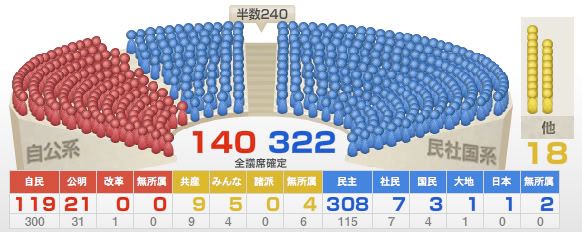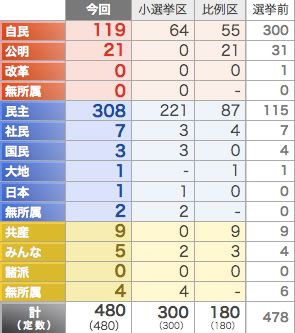  |
Why did the Japanese Left fail to advance? Take a look at this video of the 21 August 2009 press conference of JCP Chaiman Shii Kazuo (which comes with English translation), and you'll get a clue.
JCP criticisms of the DPJ agenda are to the point more often than not (which you can see in more detail in 「国民が主人公」の新しい日本を -- 日本共産党の総選挙政策), but those criticisms don't amount to a compelling vision of a new socialist society that the party should be presenting.
The strongest point of the JCP criticisms of the DPJ is that the DPJ will pay for its promise to expand the social safety net, including the formerly excluded, by increasing the taxes on working-class incomes, leveling down the existing structures of entitlements such as pensions toward the new social minimums, decreasing public works and public-sector jobs, and so on, the trade-off that the DPJ will make inevitable given its refusal to tax big businesses and capitalists and to cut military spending.
But, in the process of making this point, the JCP ends up defending the old, such as tax exemptions for dependent spouses (usually housewives), which have discouraged many a woman from seeking full-time jobs since wives earning only part-time incomes (roughly up to 1,300,000 yen) are counted as dependents for the purpose of calculating taxes, insurance and pension contributions and benefits, etc. What's good for working-class families in material terms can be bad for working-class women looking to enhance their gender-bargaining power vis-a-vis men, and the structures of the Japanese welfare state that tacitly assume male family wages, lifetime monogamous marriages, female spousal dependency, etc. are textbook cases of the common class-gender contradiction under capitalism. This contradiction is intensifying as more and more Japanese women are clearly losing interest in marriage and childbearing, powerfully demonstrating their sharp rejection of the old gender settlement and silently erecting a strong demographic obstacle to the old methods of restoring economic growth. The JCP, or any other left-wing current in Japan, needs to offer women -- and young people in general -- a new socialist vision that addresses women as individuals in their own right and creates new networks of social solidarity other than biological families, rather than a maternalist Keynesian vision in which women are tacitly assumed to be, or become, or have been wives and mothers.
The same goes for the JCP's defense of the Peace Constitution. On one hand, any constitutional revision that the DPJ will put on the agenda will likely be one that pushes Japan onto the course that Germany took in the process of the dissolution of Yugoslavia, embarking on humanitarian imperialist adventures of its own, not just as a subordinate member of the US-led coalition of the willing. On the other hand, there is nothing democratic, let alone socialist, about defending the constitution that the occupier wrote for Japan, on which the Japanese people have not been allowed to vote. Socialists must present a new democratic vision for Japan. Why not a constitutional assembly in Japan, to write a new constitution as a step toward 21st century socialism?
* The proportion of the total vote for the Communists, however, registered a slight decline, from 7.25% to 7.03%.




2 comments:
Fabulous analysis, thanks.
As I predicted, the bases in Okinawa--their expansion under the name of 'reduction'--has become one of the issues too hot for the still-new government to handle. The JCP threw their support behind the usual 'conservative' in Nago elections over this base expansion issue. The question is, can the JCP make it a national issue and stir up enough other people, like the ones in the coalition government, to force Hatoyama to do anything?
Post a Comment